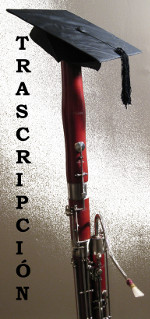Weissenborn Opus 8/2, Study #19 for advanced bassoon students.
Further rhythmic practice including rhythms that break triplet groupings.
Guest performer Genesis Neely. By Terry B. Ewell, Bassoon Digital Professor.
Weissenborn Opus 8/2, Estudio Avanzado #19. Más práctica con ritmos, incluyendo
ritmos que rompen grupos de tresillos. Intérprete invitado: Genesis Neely.
Por Terry B. Ewell, Profesor Digital de Fagot. Traducido por Germán Martínez López.
TUTORIAL
1. Welcome, this is Terry Ewell.
Study 19 is like a marathon! It demands concentration to accurately
perform all the notes all the way to the end. Furthermore the performer
does so with depleted oxygen levels because the breaths are spaced so
far apart. It is quite a challenge to perform this study with accuracy
while breathing only in the places indicated.
1. Bienvenidos, soy Terry Ewell. ¡El Estudio #19 es como una
maratón! Requiere concentración para ejecutar todas las
notas, de forma precisa, hasta el final. Además, el
intérprete tiene que tocar con bajos niveles de oxígeno
porque las respiraciones están muy alejadas entre sí. Es
un desafío tocar este estudio con precisión, respirando
solo en los lugares indicados.
2. In addition to practicing short sections with sprints, beat
displacement with rhythms can help mastery of this study. For example
here are the two obvious beat divisions with rhythms starting in line 7:
2. Además de practicar seciones cortas con sprints, el
desplazamiento de pulsos con ritmos puede ayudaros a dominar este
estudio. Por ejemplo, aquí tenéis dos divisiones de
pulsos con ritmos, empezando en la línea 7:


3. However, for even greater mastery try imposing a pattern of
four notes over the triplets:
3. Sin embargo, para un mayor dominio, intentad imponer un patrón de cuatro notas sobre los tresillos.

REFLECTION REFLEXIÓN
4. … he goes before them; and the sheep follow him,
for they know his voice. (NKJV, John 10:4)
4. “…va delante de ellas, y las ovejas lo siguen porque reconocen su voz.” (Juan 10:4, NVI)
5. This is the second of three reflections on hearing God’s
voice. If you have not listened to the first reflection contained in
the video on Weissenborn study #18 I encourage you to do so now.
5. Esta es la segunda de tres reflexiones acerca de oír la
voz de Dios. Si tú no has escuchado a la primera
reflexión contenida en el video Weissenborn estudio #18 te animo
a que lo hagas ahora.
6. Here are some further summaries of the article by Harry
Leesment. These comments help to clarify the difference between
God’s voice and the destructive voices of adversaries.
6. Aquí está la continuación del resumen del
artículo escrito por Harry Leesment. Estos comentarios ayudan a
clarificar la diferencia entre la voz de Dios y las voces destructivas
de adversarios.
7. Forget the past vs. remember the past. God
forgives our sins, our mistakes. The adversary loves to replay
“videos” of our past wrong doings.
7. Olvida el pasado vs. Recuerda el pasado.
Dios perdona nuestros pecados, nuestros errores. El adversario ama
repetir “videos” de nuestras pasadas malas acciones.
8. Attraction to God vs. rejection. The
Spirit of God pulls us toward God. Evil forces convince
people that they are unworthy and rejected by God.
8. Atracción a Dios vs. Rechazo.
El Espíritu de Dios nos atrae hacia Dios. Las fuerzas malvadas
convencen a la gente de que son indignas y rechazados por Dios.
9. Rightly brings the Bible vs. distorts the
Bible. The Spirit of God is given to help us understand
the Bible. Adversaries, however, want to twist the words and their
meanings.
9. Utiliza la Biblia Correctamente vs. Distorsiona la Biblia.
El Espíritu de Dios es dado para ayudarnos a entender la Biblia.
Los adversarios, sin embargo, quieren retorcer la palabra y su
significado.
10. Draws you into fellowship vs. isolates. God
wants a family, a community of those who believe in Him. The
adversaries want loners who are easy to destroy.
10. Te lleva a la comunión vs.
Te aísla. Dios quiere una familia, una comunidad de aquellos que
creen en Él. Los adversarios quieren personas solitarias que
sean fáciles de destruir.
CREDITS CREDITOS
Harry Leesment, The Evidence
(November/December 1985): 33.



